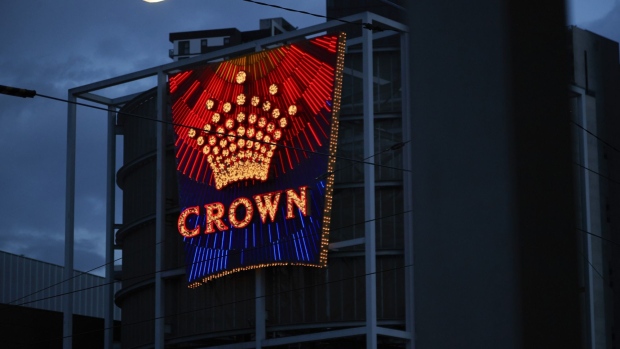Oct 26, 2021
Problem Gamblers Let Loose for 24-Hour Sessions at Crown Casino
, Bloomberg News

(Bloomberg) -- Crown Resorts Ltd. allowed gamblers at its flagship Melbourne casino to play for more than 24 hours straight, targeted elderly and vulnerable groups and let people continue gambling even when they were in debt to the casino, an inquiry found.
Despite being found unfit to hold a gaming license, the company has been given two years to address a litany of wrongdoing uncovered by the so-called Royal Commission, including facilitating money laundering and underpaying taxes.
Read more: Crown Has Two Years to Clean Up or Lose Its Melbourne Casino
“Perhaps the most damning discovery by the Commission is the manner in which Crown Melbourne deals with the many vulnerable people who have a gambling problem,” former judge Ray Finkelstein, who led the inquiry, wrote in his 652-page report released Tuesday. “Crown Melbourne had for years held itself out as having a world’s best approach to problem gambling. Nothing can be further from the truth.”
Crown “consistently failed” to comply with the Gambling Code, which limits the time a patron can spend gambling, the inquiry found.
In one case study included in the report, a woman named Carolyn detailed how she stole more than A$400,000 ($300,000) from her employer to feed her gambling addiction. Ultimately, her crime was discovered and she was sent to prison, aged 64. She now lives a “modest” life with “nothing to show” for her years of hard work, according to the report. Even when she spent all day gambling, no one ever approached her to ask if she was alright or suggest she take a break.
In another, Elizabeth, a school teacher, gambled for 52 hours straight, losing her last A$5,000 from the sale of her house. Following further losses, she drove to Melbourne’s Westgate Bridge and considered taking her life. She was stopped by the waist-high railing and the lights of passing ship that brought her back to her senses, the report said.
The inquiry heard of one gambler who was allowed to continue playing even after a A$100,000 check he had exchanged for chips (which he lost) bounced, so he could pay the debt from future winnings.
Loyalty and reward programs were also used to encourage gambling. Players at free bingo sessions, popular with the elderly, were given vouchers for table games and slot machines. One loyalty-program member went to the casino to collect “free” concert tickets and lost A$30,000 gambling.
One program was directed toward older people who were bussed to the casino and given a free musical performance and buffet lunch, but also required to stay for between four to six hours. In that time, many would gamble, particularly on slot machines.
“Many senior executives involved in the misconduct were indifferent to their ethical, moral and sometimes legal obligations,” Finkelstein wrote. “Some were motivated by a drive for profit. Some simply did what they did because they could.”
©2021 Bloomberg L.P.